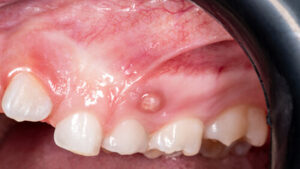Tooth abscesses in children, a form of dental abscess, are alarmingly common yet often overlooked aspects of dental health. These abscesses occur when bacterial infections lead to pockets of pus in the tooth, causing intense pain, swelling, and potential complications if left untreated. The importance of recognising and appropriately addressing a tooth abscess in a child cannot be overstated, as it affects not only the affected tooth but the overall health of their teeth and gums.
This blog aims to provide comprehensive insights into various aspects of tooth abscesses in children, including the difference between periapical and periodontal abscesses, symptoms like tooth sensitivity and swollen gums, and the necessity of professional treatment options such as root canal therapy or, in rare cases, tooth extraction.

What is a Tooth Abscess?
A tooth abscess in a child is a serious bacterial infection forming a pus pocket in the affected tooth or surrounding gum tissue. This dental condition can manifest as either a periapical abscess at the tip of the tooth’s root due to an infected nerve or a periodontal abscess affecting the gums. The primary cause of a tooth abscess is untreated tooth decay, often exacerbated by poor dental hygiene practices such as inadequate use of a soft toothbrush and dental floss.
Children with a tooth abscess may experience intense pain, especially when chewing or when the affected tooth is exposed to hot or cold temperatures. Other common symptoms include swollen gums around the infected tooth, a bad taste in the mouth, tooth sensitivity, and, in severe cases, facial swelling. If a tooth abscess is left untreated, the infection can spread to soft tissue, potentially leading to life-threatening complications.
Parents should be vigilant for these signs and seek prompt dental treatment if an abscess is suspected. Treatment options range from antibiotics to address the bacterial infection to more invasive procedures like root canal therapy or tooth extraction in rare cases. Early intervention by a paediatric dentist can prevent infection and safeguard the child’s oral health.
Causes of Tooth Abscesses in Children
Tooth abscesses in children can arise from various causes, with poor dental hygiene being a primary factor. When a child’s teeth and gums are not regularly cleaned with a soft toothbrush and dental floss, plaque accumulates, leading to tooth decay – a significant precursor to dental abscesses. Additionally, a diet high in sugary and acidic foods contributes to the deterioration of tooth enamel, further increasing the risk of abscess formation.
Physical injuries to a child’s mouth, such as a broken or chipped tooth, can also lead to an abscessed tooth if bacteria enter the damaged area. In some cases, a previous dental treatment, like a root canal, might not fully eradicate an infection, leaving the child susceptible to a periapical abscess.
Certain medical conditions and genetic predispositions can exacerbate the risk of developing dental abscesses. For instance, children with weakened immune systems due to medical treatments or hereditary conditions are more prone to bacterial infections, including those in the teeth and gums.
Recognising these causes is crucial for prevention and early treatment. Parents should ensure regular dental check-ups for their children and seek professional treatment from a paediatric dentist if symptoms like tooth pain, swollen gums, or facial swelling arise. Early intervention can prevent the infection from spreading and avert the need for more severe treatments like tooth extraction.
Treatment Options
Treating a tooth abscess in a child typically involves professional dental treatment and at-home care. The treatment choice depends on the severity of the abscess and the affected tooth’s condition.
- Antibiotics: If the child’s tooth abscess is accompanied by swollen gums or facial swelling, indicating a spread of the bacterial infection, a paediatric dentist may prescribe antibiotics. These help control the infection and are usually used with other treatments.
- Drainage: When an abscess forms a visible pus pocket, the dentist might drain it to alleviate pain and remove the infection. This procedure is often necessary for periodontal abscesses.
- Root Canal Therapy: Root canal therapy is a common solution for a periapical abscess, where the infection originates from the infected nerve inside the tooth. This procedure involves removing the infected nerve and dental pulp, cleaning the inside of the tooth, and sealing it to prevent further infection.
Tooth Extraction: In cases where the tooth is severely damaged and cannot be saved, or if the child experiences intense pain and other treatments are not viable, tooth extraction might be recommended. This is a last resort when other treatments cannot preserve the affected tooth.
- Follow-up Care: Proper dental hygiene using a soft toothbrush and dental floss is crucial to prevent recurrence after initial treatment. Regular dental check-ups are essential to monitor the child’s teeth and gums and ensure the infection does not return.
In all cases, timely intervention is crucial. If a tooth abscess is left untreated, it can lead to more severe complications. Parents should seek immediate dental services if they suspect their child has a tooth abscess.
Conclusion
This blog has underscored the crucial aspects of identifying, treating, and preventing tooth abscesses in children. Emphasising timely dental treatment and awareness of symptoms like swollen gums, tooth pain, and infection spread, we’ve highlighted the importance of maintaining a child’s oral health. Parents are encouraged to proactively seek professional dental advice for their children’s teeth and gums health. For comprehensive dental care and expert advice on your child’s oral health, consider visiting Bright-On Bay Dental. Call us at (02) 9538 7028 for a consultation and ensure your child’s smile stays bright and healthy!
Note: Any surgical or invasive procedure carries risks. Before proceeding, you should seek a second opinion from an appropriately qualified health practitioner.
References:
https://www.healthline.com/health/abscessed-tooth
https://www.webmd.com/oral-health/dental-abscess


 Tooth Extraction: In cases where the tooth is severely damaged and cannot be saved, or if the child experiences intense pain and other treatments are not viable, tooth extraction might be recommended. This is a last resort when other treatments cannot preserve the affected tooth.
Tooth Extraction: In cases where the tooth is severely damaged and cannot be saved, or if the child experiences intense pain and other treatments are not viable, tooth extraction might be recommended. This is a last resort when other treatments cannot preserve the affected tooth.
Recent Comments